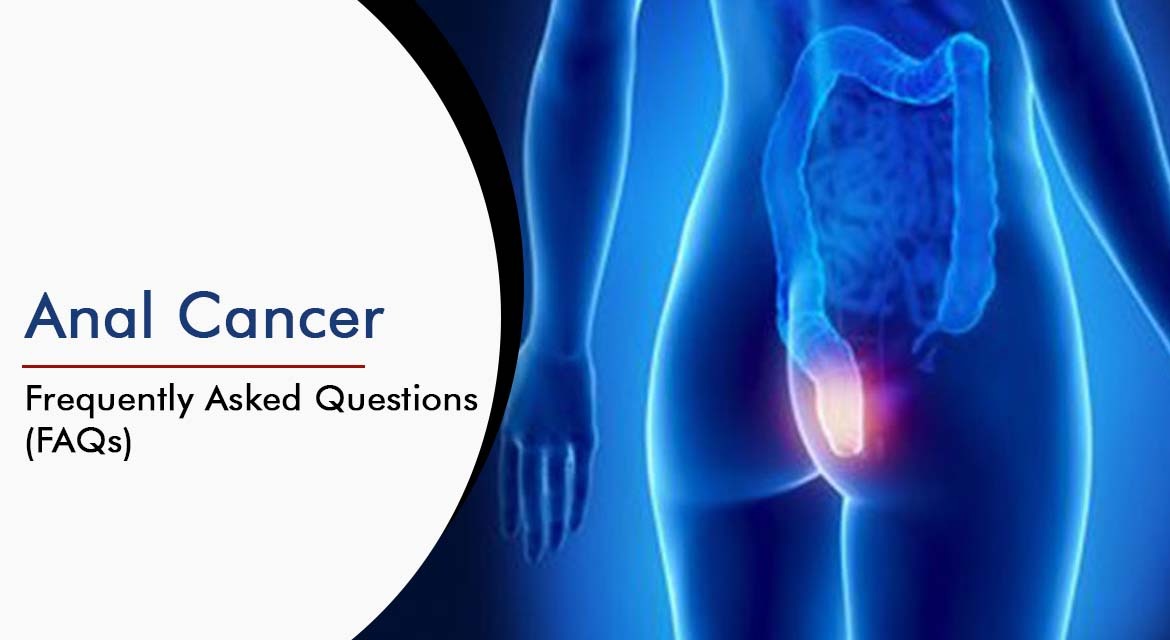Following are all the related FAQs for Anal cancer:
Q 1. What is Anal Cancer?
Ans. Anal cancer is a disease in which malignant (cancer) cells form in the tissues of the anus. The anus is the opening at the lower end of the intestines. It’s where the end of the intestines connect to the outside of the body.
Q 2. What are Different Types of Anal Cancer?
Ans. They are often divided into 2 groups, which are sometimes treated differently:
1. Cancers of the anal canal (above the anal verge)
2. Cancers of the anal margin (below the anal verge)
Q 3. What all Types of Tumor Can Develop in Anus and are They All Malignant/Cancerous?
Ans. Many types of tumors can develop in the anus. Not all of these tumors are cancers – some are benign (not cancer).
Polyps
- Inflammatory polyps start because of irritation from injury or infection.
- Lymphoid polyps are caused by an overgrowth of lymph tissue (which is part of the immune system). Lymph tissue under the anal inner lining (mucosa) is normal, but these overgrowths are not.
- Hypertrophied anal papillae are benign growths of connective tissue that are covered by squamous cells. Hypertrophied anal papillae are also called fibroepithelial polyps.
Skin Tags
Skin tags are benign growths of connective tissue that are covered by squamous cells. Skin tags are often mistaken for hemorrhoids (swollen veins inside the anus or rectum), but they’re not the same.
Anal Warts
Anal warts (also called condylomas) are growths that form just outside the anus and in the lower anal canal below the dentate line. Sometimes they can be found just above the dentate line. They’re caused by infection with human papilloma virus (HPV). People who have or had anal warts are more likely to get anal cancer.
Q 4. What is Meaning of Precancerous Conditions Affecting Anus?
Ans. Some changes in the anal mucosa are harmless at first, but might later develop into a cancer. These are called pre-cancerous conditions. A common term for these potentially pre-cancerous conditions is dysplasia. Some warts, for example, contain areas of dysplasia that can develop into Anal cancer.
Q 5. Enumerate Different Types of Cancer that Can Start in the Anal Region?
Ans. The different types of cancer that can start in the anal region:
1. Squamous cell carcinomas
2. Cloacogenic carcinomas
3. Adenocarcinomas
4. Basal cell carcinomas
5. Melanomas
6. Gastrointestinal stromal tumors (GISTs)
Q 6. What are Risk Factors?
Ans. Many people with risk factors never develop anal cancer, while others with this disease may have few or no known risk factors.
1. The 2 types of HPV that cause most cases of anal and genital warts are HPV-6 and HPV-11. While anal warts themselves are unlikely to develop into anal cancer, people who have had anal warts are more likely to get anal cancer. This is because people who are infected with HPV subtypes that cause anal and genital warts are also more likely to be infected with HPV subtypes that cause anal cancer. HPV is passed from one person to another during skin-to-skin contact with an infected area of the body. HPV can be spread during sexual activity – including vaginal, anal, and oral sex – but sex doesn’t have to occur for the infection to spread.
2. Women who have had cancer of the cervix, vagina, or vulva are at increased risk of anal cancer.
3. In men, it would seem likely that having had penile cancer, which is also linked to HPV infection, would increase the risk of anal cancer, but this link has not been shown in studies.
4. People infected with the human immunodeficiency virus (HIV), the virus that causes AIDS, are much more likely to get anal cancer than those not infected with this virus.
5. Receptive anal sex also increases the risk of anal cancer in both men and women. Because of this, men who have sex with men have a high risk of this cancer.
6. Smoking increases the risk of anal cancer. Current smokers are several times more likely to have cancer of the anus compared with people who do not smoke.
7. Higher rates of anal cancer occur among people with reduced immunity, such as people with AIDS or people who have had an organ transplant and must take medicines that suppress their immune system.
8. Anal cancer is more common in women than men.
Q 7. How is this Cancer Treated?
Ans. The 3 main ways to treat anal cancer are:
• Surgery for Anal Cancer
• Radiation Therapy for Anal Cancer
• Chemotherapy for Anal Cancer
Also Read:




